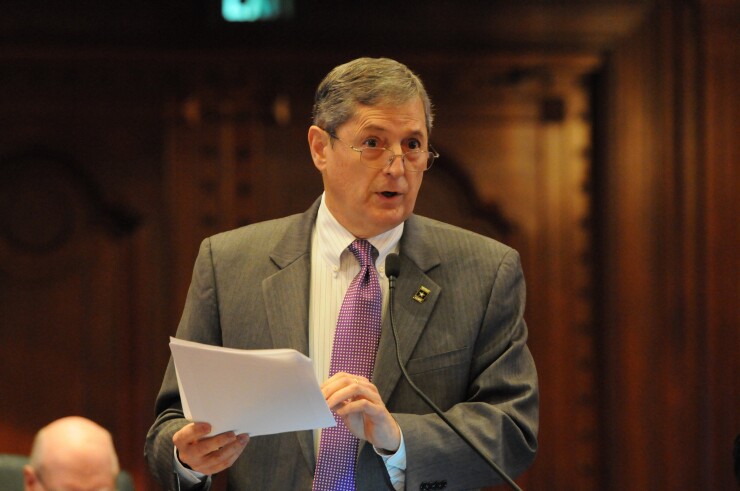Want unlimited access to top ideas and insights?
With revenues on the upswing, Illinois Gov. J.B. Pritzker dropped a controversial proposal to re-amortize the state’s current pension schedule.
The April numbers came in so strong that they drove revisions for estimates this year. The administration is also revising fiscal 2020 estimates upward.

The news Tuesday provided the governor with an excuse to dispose of a pension proposal that has met with opposition from fellow Democrats, with some saying it lacked the votes needed to pass.
Pritzker's re-amortization plan would have freed up about $1 billion for his fiscal 2020 budget. Municipal bond market participants had raised alarms that the move could trigger or contribute to a downgrade that would cost the state its investment grade status.
The market should view the governor’s decision as a good move whether or not it’s part of a broader strategy to pass other big-ticket items on his agenda.
“Basically it's just bad practice to keep pushing pensions off. Ideally, if you have a plan and schedule you should stick to it and if you don’t you will be judged by that,” said Howard Cure, director of municipal bond research for Evercore Wealth Management. “What the market would really to see the state do is make progress” in improving the health of the pension system.
Illinois will now make the scheduled $9.1 billion contribution certified by its five pension funds and state auditor general for the fiscal year beginning July 1. The plan to push off the current funding schedule by seven years to 2052 would have trimmed $952 million off the contribution, while extending a pension buyout program would trim $125 million off the payment. The state is still eyeing the continuation of an existing buyout.
“The state will be able to meet the current funding commitment to the retirement systems without extending the ramp this year,” State Revenue Director David Harris and Budget Director Alexis Sturm wrote
The state is saddled with $133.7 billion of unfunded pension liabilities and the system is just 40% funded. The re-amortization would have worsened those numbers in the short-term despite assurances from the governor that his other pension proposals would bolster the funded status in the future.
Revised figures for the current fiscal year will also allow Illinois to wipe out most of the $1.6 billion gap in the current year’s budget. The Governor’s Office of Management and Budget and the Department of Revenue will increase this year’s collection forecast by 7%, or $1.25 billion, for individual income taxes and $186 million for corporate taxes compared to February estimates.
The administration is also now revising fiscal 2020 revenue upward by $800 million, or 4%, to $22 billion from projections used to craft the proposed fiscal 2020 $39 billion general fund budget.
The elimination of the current year’s deficit eases budget pressures headed into the new fiscal year and dropping the pension proposal allows Pritzker to save his political capital for other tough votes that lay ahead on a graduated tax constitutional amendment in the House, and legislation to legalize recreational cannabis and expand gambling.
The 2020 proposed budget, which also faces a late session vote, relies on $170 million from license fees tied to legal marijuana and $212 million from sports betting. If the graduated tax makes it to the ballot and is approved with Pritzker's proposed rates, it would generate more than $3 billion for the state beginning in fiscal 2021.
“This is good news arriving at a good time,” said John Patterson, spokesman for Senate President John Cullerton, D-Chicago.
The state collected $4.1 billion in individual and corporate income tax revenues in April, up $1.14 billion or 38% from the prior year and more than $1.5 billion above what was previously projected for the fiscal year to date.
“A number of factors likely contributed to this increase, including the performance of the stock market, better federal reimbursement for Medicaid, the elimination of the federal state and local tax deduction and additional changes in the federal tax law that meant many taxpayers didn’t withhold sufficient taxes through payroll deductions, back-loading their end-of-year tax payments,” the letter says.
The administration does caution that some of those factors can’t be counted on going forward. “These sources include the stock market’s performance and taxpayers’ adjustments in their withholdings because of the new federal tax law. These factors have limited the growth that can be expected,” says the letter.
The letter makes clear that the re-amortization was dropped for only this year. It leaves the door open to future consideration.
“Over the coming months, the administration will continue to work on a responsible approach to the state’s unfunded pension liabilities, which continue to threaten to crowd out vital investments in education and public safety,” it says.
The re-amortization was among five measures announced by deputy governor Dan Hynes in February. The other pieces included bolstering funded ratios through potential asset transfers or sales, the extended pension buyout, the issuance of $2 billion of pension obligation bonds, and putting $200 million annually from a graduated tax into the pension fund. Pritzker also appointed a pension asset value and transfer task force and pension consolidation task force that is expected to report on ideas this summer.
“Our expectation is that the Legislature will be able to take their recommendations into account as we work together to finalize a long-term pension reform plan and continue to work with the Legislature to develop a long-term pension plan,” said the letter.
Even before April’s strong showing, closely-tied economic sources had performed quite well, the non-partisan Commission on Government Forecasting and Accountability said in
State Comptroller Susana Mendoza cautioned against getting too excited about the April numbers.
“It is important to keep in mind that we still face a $6-to-$8 billion backlog of pending bills with no dedicated revenue stream to pay them,” she said in a statement.





